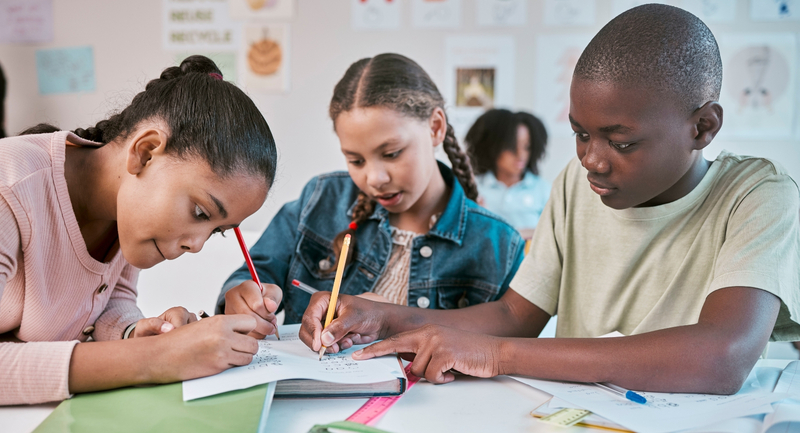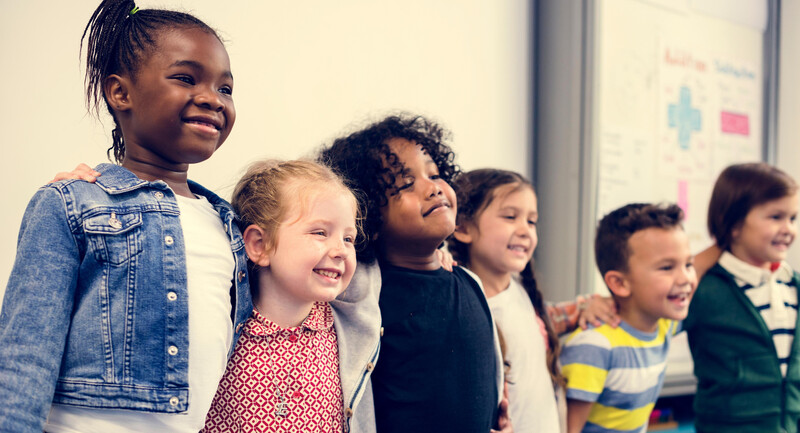In the wake of George Floyd’s death, America seems to be in social upheaval. A June 7 poll by NBC and the Wall Street Journal revealed that 80 percent of voters believe America is out of control. As the country continues to fight through the coronavirus pandemic, tough decisions about the economy and public safety are being weighed. The school year is winding down across the country, with no end in sight to the impact of the pandemic on educational outcomes. Many students, particularly Black children, are struggling emotionally with where they stand as young Black Americans. They readily acknowledge their youth and Blackness but are cautious to embrace the American identity because of the overt racism and ravenous hate that is often afflicted upon Black America. The entire nation watched in ghastly disbelief as George Floyd’s final breaths were taken at the hands of another state sanctioned officer of the law. It happened in real time; the brute inhumanity of officer Derek Chauvin was on full display in broad daylight, and it could easily be witnessed through video footage. Floyd’s death has caused many Black youth to wonder aloud, “Am I next?”
“FLOYD’S DEATH HAS CAUSED MANY BLACK YOUTH TO WONDER ALOUD, ‘AM I NEXT?‘”
Hundreds of thousands of young, elderly, middle-class, poor, Latinx, Black and White individuals took to the streets to protest the egregiously excessive use of hate-force and to mourn Floyd’s death. But his martyrdom must be put in the context of Ahmaud Aubrey’s death in February, as well as the death of Breonna Taylor, and the racial bullying maliciously, but haphazardly perpetrated by Amy Cooper.
The fact of the matter is that these deaths are on the heels of Javier Ambler. Which is on the heels of Botham Shem Jean and Stephon Clark. Those killings, while tragic, are on the heels of the assault on James Blake, the murders of Michael Brown, Tamir Rice, Laquan MacDonald, Sandra Bland and Philando Castillo. From Malice Green to Rodney King to Mack Charles Parker, there is a legacy of state sanctioned violence against Blacks that is emblazoned in the pages of American history. Until recently, those pages have been stuck together and characterized as “our story,” as opposed to an authentic and integral part of American history. Nevertheless, these murders are not new. Nor is it unfounded to see murderers receive no indictment or not be convicted in such cases. Time after time, we have seen it take weeks or months to see charges filed, if charges are filed at all.
What is new is the opportunity for shared outrage. Social media and technology make it easier for citizens to share their frustration and rage with complete strangers. It has galvanized us to take action, where in the past we may have teemed in silos. This galvanization will have minimal effect if we do not act differently in the aftermath of Floyd’s death. Floyd’s death, while dreadful, will be a footnote in the biography of violence against Black Americans if we do not demand meaningful change. Teachers should be on the frontlines of creating this change.
In my first book, The Burning House: Educating Black Boys in Modern America, I discuss the differences between effective teachers and firefighters for Black children. Firefighters are teachers working to put out the flames of racism in our schools. This enables Black children to extinguish the flames of racism in society. Teachers must pick up the mantle to dismantle. Education is a political act. If you are a teacher who is not rethinking your practice as an educator, you are missing the point of what it means to work for equity for Black Americans. Teachers should be rethinking their thoughts about race, politics, education and the intersection of the three. Many Black males succumb to a political and educational disenfranchisement that renders them ineffective in supporting causes such as equal policing, criminal justice reform, school reform, etc. If we want to play our part in ending the death of the George Floyds and Tamir Rices, we need to politically embolden Black children.
“EDUCATION IS A POLITICAL ACT. IF YOU ARE A TEACHER WHO IS NOT RETHINKING YOUR PRACTICE AS AN EDUCATOR, YOU ARE MISSING THE POINT OF WHAT IT MEANS TO WORK FOR EQUITY FOR BLACK AMERICANS.”
I give the following advice to teachers to promote societal change starting in their classrooms and support Black children moving forward, both in the wake of Floyd’s death and the renewed energy around the Black Lives Matter movement.
Challenge your thoughts about race
Does your perception on racism positively and/or negatively impact students? Drill down and answer this question for each racial group you serve. Your actions have to move toward ending white supremacy. If not, you will be an agent of racism. Continue to redefine equity. For African Americans, it is more than exposure to the middle class. On the contrary, it is restoring Black people to their state before their enslavement.
Challenge your definition of education
Society generally defines education as bringing out the best in students. This is a by-product of education. Education’s chief function is to secure the survival of a people by solving problems within their communities. Despite Covid-19, 2020 has exposed that racism is the ultimate pandemic. Every lesson taught should turn its attention toward ending white supremacy.
Challenge the systems in your building
How is discipline handled in your building? How do you communicate with parents? Are they equal partners or gadflies to be dealt with on uncomfortable occasions? Is special education supporting the adult functionality of your students, or is it a room within the burning house?
Challenge your classroom practices
How is discipline in your class? What is your approach to misbehavior? Is it punitive? Are you working to teach new behaviors when you discipline? If not, it may be a room within the burning house.
Challenge your pedagogy
Do you talk too much? Are your students up and talking and debating and are they encouraged to do so? Do you place the various cultures of students at the center of instructional practices or is your teaching style based on an antiquated, Euro-centric model? If you are not content with your answer, your classroom may be a room within the proverbial burning house.
Challenge unfair testing practices
Black children are subjected to testing practices that are a financial windfall for testing companies. They are, at best, a measure of one’s exposure to dominant culture. They are not an accurate measure of teaching and learning, and certainly should not be used to make decisions about student aptitude or intelligence. This readily happens in the neoliberal cultural of many urban schools. Teachers have to remain on the frontlines of this battle, as it is one of the most fiery rooms within the burning house.
Challenge the systems outside your school building that impact education
Challenge the lack of community control of schools in Black neighborhoods. All politics is local. Why are Black Americans continuously locked out of the control of the schools they send their children? White educational control is engrained and understood, as they have a teacher force, curriculum, learning standards, and assessment tools that fit their cultural mores for a robust set of societal outcomes.
As summer approaches we must use this “down” time to reflect, re-assess, re-evaluate and move to become better practioners for a better tomorrow. School is the incubation hub of society. A group of individuals unable to solve their societal problems have been unable to address issues at the school level. The haves and have-nots are entrenched and reinforced in our schooling. Teachers should find accountability partners. Join Twitter chats, Zoom meetings, and townhall events to engage in conversation around the need to replace racism with a system of justice. After the conversation and reading, you and I must act. It helps to start small. We can start with the children in front of us every day, whether that be via distance learning or in person. When we influence control there, we can then advocate within our departments and grade levels, to our principals, while sharing our advocacy work with teachers across district and state lines.
One of my former students is a rising high school junior. He is intelligent, aware, and ready to take on the world. As we discussed the events in the wake of Floyd’s death, he asked me what I thought of the Black Lives Matter mural in Lafayette Square outside the White House. “It looks dope, right?” I could only think of Derrick Bell’s warnings in Faces at the Bottom of the Well, when he postulated that white supremacy stays steps ahead of those fighting for racial justice by giving trinkets and tokens with a limited racial legacy. You and I must pick up the mantle to dismantle and not settle for such symbolic trinkets. If we do not, Floyd’s death will not be an inflection point in racial reform, but a minor hiccup in white supremacy’s long history of adapting to maintain itself.
About the author
Desmond Williams is a former teacher and principal in Washington, D.C. He is the founder of Nylinka School Solutions LLC, an organization that focuses on helping schools improve their academic and behavorial practices for vulnerable students. He is the author of the newly released The Burning House: Educating Black Boys in Modern America. You can follow him on Twitter.
Desmond Williams is a former teacher and principal in Washington, D.C. He is the founder of Nylinka School Solutions LLC, an organization that focuses on helping schools improve their academic and behavorial practices for vulnerable students. He is the author of the newly released The Burning House: Educating Black Boys in Modern America. You can follow him on Twitter.

Timeless Lessons from Civil Rights Teachers
Tarsha I. Herelle & Andrene J. Castro et al.2 months ago






